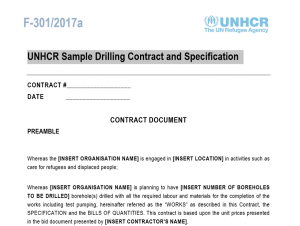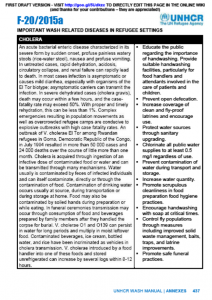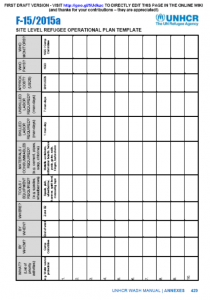Publisher: UNHCR Year: 2017 Description: UNHCR has developed a sample drilling contract and technical specifications. These should be utilised for all drilling activities commissioned by UNHCR or its partners. The generic contract and specifications documents are provided in word format and should be modified to include the requirements that will be met for each individual […]
Archives
F-301/2017a UNHCR Sample Drilling Contract and Technical Specification

F-300/2017a UNHCR Well Construction Documentation

Publisher: UNHCR Year: 2017 Description: UNHCR has developed a standard excel-based form that should be used to capture all the important information during well construction. The excel file can be downloaded by following the link at the bottom of this page. Once you have downloaded the excel file, you can watch the explanatory videos. Three […]
- Tags: Boreholes, Boreholes, Drilling, Drilling, and Groundwater. Categories: Training Materials and WASH Operational Guidelines.
F801/2015a – Toilet Block Management Sample Community Agreement (UNHCR, 2015)

This toilet block management sample community agreement can help define the responsibilities of the different stakeholders in operation and maintenance of WASH facilities from filling up the hand-washing water containers, and keeping the surroundings clean, to providing maintenance.
F-402/2016a Drain Field Sizing Spreadsheet (UNHCR, 2016)

This sizing calculation tool has been designed to assist UNHCR and WASH actors correctly size drain fields for septic tanks in displaced settings taking into account numbers of users, soil type, and wastewater and sewage flows.
- Tags: Drain Fields and Drainage.
F-302/2015a Well Cleaning and Chlorination Log Sheet (UNHCR, 2015)

This is the standard UNHCR well cleaning and chlorination template for refugee settings available in PDF and MSExcel formats. The form should be completed each time a hand dug well is cleaned, chlorinated and tested for faecal coliforms. The form is available in MSExcel format so WASH actors can adapt the content to the context.
F-503/2015a UNHCR Landfill Waste Register (UNHCR, 2015)

UNHCR field staff and their partners should use this waste register form to keep a record of the types and quantities of waste being disposed at each landfill facility. Ideally waste management short, medium and long term strategies for different waste streams should be re-evaluated and re-organised based on the data collected from this tool.
F-401/2016a Septic Tank Sizing Spreadsheet (UNHCR, 2016)

This sizing calculation tool has been designed to assist UNHCR and WASH actors correctly size septic tanks in displaced settings taking into account numbers of users, wastewater and sewage flows, sludge and scum accumulation rates, desludging periods, liquid retention times, and average annual ambient temperatures.
- Tags: Communal Toilets, Communal Toilets, Excreta Treatment, Grey Water Disposal, Grey Water Disposal, Septic Tanks, and Septic Tanks. Categories: WASH Design Guidelines, WASH Design Guidelines, and WASH Technical Designs.
F-200/2015a Summary of Important WASH Diseases in Refugee Settings (UNHCR, 2015)

This document provides a quick summary of the most important WASH related diseases for refugee settings and includes a list of recommended control strategies.
F-105/2015a Site Level Refugee WASH Operational Plan Template (UNHCR, 2015)

This template can be used to help UNHCR and WASH actors establish a simple WASH operational plan (WHO will do WHAT, WHERE, WHEN, and HOW and WHO will PAY and WHO will MONITOR). This template can be used in addition to the site level WASH Strategy Template.
F902/2015a UNHCR WASH Rapid Assessment Forms (UNHCR, 2015)

These rapid (emergency) assessment tools can be used to help assess water supply, excreta management, solid waste management, hygiene and disease vector control conditions in the following refugee settings: These rapid (emergency) assessment tools can be used to help assess water supply, excreta management, solid waste management, hygiene and disease vector control conditions in the following refugee settings: Camps; Settlements; Transit Centres; Schools; Health Centres and Urban Settlements. It also contains references to UNHCR’s WASH indicators and recommendations for data collection.
- Tags: WASH Assessments. Languages: English, English, English, English, English, English, English, English, English, and English. Organisations: UNHCR, UNHCR, UNHCR, UNHCR, UNHCR, UNHCR, UNHCR, UNHCR, and UNHCR. Categories: WASH Emergency Guidelines, WASH Emergency Tools, WASH Reference Documents, WASH Reference Documents, WASH Reference Documents, WASH Reference Documents, WASH Reference Documents, WASH Reference Documents, WASH Reference Documents, WASH Reference Documents, and WASH Reference Documents.
 English
English
